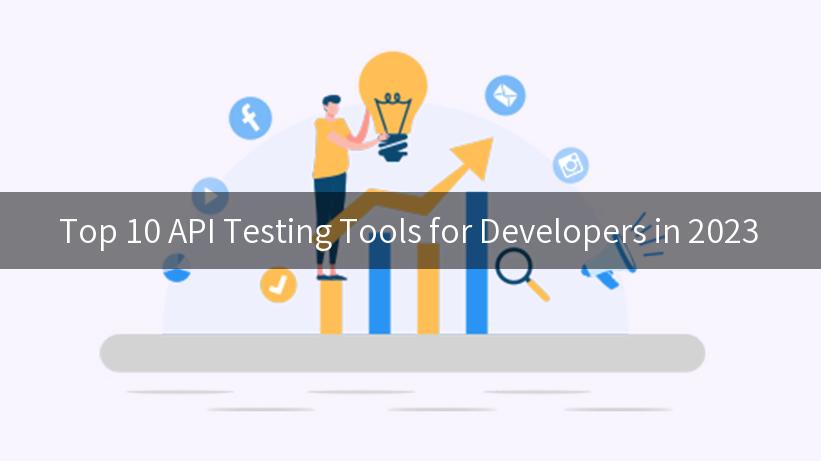
API testing is a critical aspect of modern web and mobile application development. As APIs become the backbone of these applications, ensuring their reliability, performance, and security is paramount. In 2023, developers have a plethora of API testing tools at their disposal. This article explores the top 10 API testing tools that developers should consider using this year. These tools, such as APIPark, Amazon’s Open Platform, and others, offer features ranging from traffic control to comprehensive testing capabilities.
1. Postman
Postman has consistently ranked as a leading API testing tool due to its user-friendly interface and powerful features. It facilitates the design, testing, and sharing of APIs. Developers can create requests, execute them, and get detailed reports. Postman supports automation of API tests and integrates well with CI/CD pipelines.
Key Features:
– User-friendly interface with extensive documentation.
– Automated testing and monitoring.
– Supports team collaboration.
– Integrates with version control systems.
2. APIPark
APIPark is an emerging tool that offers robust API testing solutions. It is particularly acclaimed for its traffic control capabilities, allowing developers to simulate various traffic conditions and analyze API behavior under stress.
Key Features:
– Advanced traffic management and simulation.
– Supports multiple environments and configurations.
– Comprehensive analytics and reporting.
– Easy integration with existing workflows.
3. Swagger
Swagger is renowned for its open-source tools that facilitate API development and testing. It provides a suite of tools that help developers design, build, document, and test APIs with ease.
Key Features:
– Interactive API documentation and testing.
– Supports OpenAPI specifications.
– Streamlines API design and development.
– Offers a wide range of integrations.
APIPark is a high-performance AI gateway that allows you to securely access the most comprehensive LLM APIs globally on the APIPark platform, including OpenAI, Anthropic, Mistral, Llama2, Google Gemini, and more.Try APIPark now! 👇👇👇
4. Amazon Open Platform
Amazon’s Open Platform delivers a versatile environment for API testing, especially for developers working within AWS ecosystems. It provides tools and resources for building, deploying, and testing APIs effectively.
Key Features:
– Seamless integration with AWS services.
– Scalable testing solutions.
– Comprehensive security testing features.
– Extensive support and documentation.
5. SoapUI
SoapUI is a widely used tool for testing SOAP and REST APIs. Its ability to perform functional, performance, and security testing makes it a go-to choice for many developers.
Key Features:
– Powerful scripting capabilities with Groovy.
– Supports both REST and SOAP protocols.
– Automated testing and CI/CD integration.
– Detailed analytics and reporting.
6. Katalon Studio
Katalon Studio offers a comprehensive solution for API, web, and mobile testing. With its simple setup and rich feature set, it provides an integrated environment for testing APIs efficiently.
Key Features:
– Easy-to-use interface with extensive libraries.
– Built-in templates for API testing.
– Supports data-driven testing.
– Integrates well with popular CI/CD tools.
7. JMeter
Apache JMeter is a popular open-source tool used for performance testing of APIs. It allows developers to simulate heavy loads on servers and analyze performance metrics.
Key Features:
– Robust performance testing capabilities.
– Supports a variety of protocols.
– Extensible with plugins.
– Detailed test result analysis.
8. Traffic Control with APIPark
APIPark stands out for its unique traffic control feature, which is essential for testing APIs under different network conditions. This feature helps developers understand how APIs perform under various scenarios, ensuring reliability and robustness.
# Example Python code for using APIPark traffic control
import apipark
# Initialize API client
client = apipark.Client(api_key='your_api_key')
# Set up traffic control parameters
traffic_params = {
'rate_limit': 1000, # requests per minute
'burst_limit': 500 # maximum burst size
}
# Apply traffic control to an API endpoint
client.set_traffic_control('https://api.example.com/endpoint', traffic_params)
# Execute API call
response = client.call_api('https://api.example.com/endpoint')
print(response.status_code, response.text)
9. ReadyAPI
ReadyAPI is a commercial product from SmartBear that offers comprehensive API testing solutions. It provides advanced features for functional, security, and load testing.
Key Features:
– Easy-to-use GUI with drag-and-drop support.
– Supports complex test scenarios.
– Data-driven testing capabilities.
– Integrates with various CI/CD tools.
10. Rest Assured
Rest Assured is a popular Java-based library for testing REST APIs. It simplifies the process of writing tests for REST services and integrates seamlessly with Java projects.
Key Features:
– Simple syntax for writing tests.
– Supports BDD (Behavior-Driven Development) style.
– Extensive support for testing REST services.
– Integrates with JUnit and TestNG.
Comparison Table of API Testing Tools
| Tool |
Key Features |
Best For |
| Postman |
Automated tests, team collaboration, CI/CD integration |
General API testing |
| APIPark |
Traffic control, environment simulation, analytics |
Traffic management and simulation |
| Swagger |
API documentation, OpenAPI specs, integrations |
API design and documentation |
| Amazon Open Platform |
AWS integration, scalable testing, security features |
Testing within AWS ecosystems |
| SoapUI |
REST/SOAP support, scripting, automated testing |
Functional and security testing |
| Katalon Studio |
API/web/mobile testing, data-driven tests, CI/CD integration |
Comprehensive testing solutions |
| JMeter |
Performance testing, load simulation, extensible |
Load and performance testing |
| ReadyAPI |
GUI-based testing, complex scenarios, drag-and-drop |
Enterprise-level API testing |
| Rest Assured |
Java integration, BDD support, simple syntax |
Java-based API testing |
Conclusion
Choosing the right API testing tool depends on your specific needs and the environment you are working in. Tools like APIPark and Amazon’s Open Platform offer specialized capabilities such as traffic control and seamless AWS integration, respectively, which can be crucial for certain projects. Meanwhile, tools like Postman and Swagger provide robust, general-purpose solutions that work well across various scenarios. As APIs continue to evolve, staying updated with the latest tools and features will help developers ensure their applications are secure, reliable, and performant.